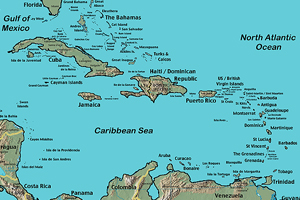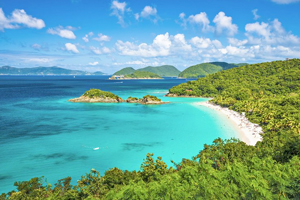What Countries Make Up the Caribbean?
By Craig Payne
 The Caribbean refers to an island group of 28 nations that attracts vacationers to it, which has a range of perfect tropical escapes located in the Caribbean Sea. The Caribbean refers to an island group of 28 nations that attracts vacationers to it, which has a range of perfect tropical escapes located in the Caribbean Sea.
Every one of these countries has got something unique about it to offer typically based upon their natural splendor of both the land and seas that surround the islands.
The Caribbean may be known as among the world's most biologically varied marine areas, being home to iconic wildlife and has numerous vulnerable coastal areas that are suffering with what environmentalists consider an alarming decline.
 The Islands also has a refreshing history and culture, possessing some considerable sites dating back to forgotten prior societies. In addition to that cultural diversity, the islands have an eclectic culinary scene. There are tastes coming from all the world's continents in the region's delicacies. The Islands also has a refreshing history and culture, possessing some considerable sites dating back to forgotten prior societies. In addition to that cultural diversity, the islands have an eclectic culinary scene. There are tastes coming from all the world's continents in the region's delicacies.
The key different languages spoken in the Caribbean are Spanish, French, English, Dutch, Haitian Creole, and Papiamento. Every Caribbean country has a handful of distinctive creole spoken languages or dialects.
The area features a mostly tropical geography with the climates getting shaped by sea temperatures and rainfall, with the typhoon season frequently leading to natural disasters. The most serious had been the Great Hurricane in 1780 where experts have approximated that 20,000 to 30,000 people were killed. Severe weather continue to take place with a regularity.
Due to this tropical environment along with the low lying island landscape, the Caribbean island nations are at risk of quite a few climate change effects like the increased storm intensity, saltwater incursion, growing sea levels along with deterioration of the shoreline. These kinds of weather shifts could have serious impacts and drastically alter the economies of the islands, particularly the significant economies of farming and travel and leisure.
The native people have occupied the islands since at least 3600 BC. Soon after the traveler, Christopher Columbus came to the Caribbean in 1492 succeeding adventurers coming from both Portugal and Spain began claiming locations in Central and South America and settling them. With this European colonization the local inhabitants was rapidly decimated because of the enforced brutal labour methods, enslavement, and illnesses on a lot of of the islands. Those indigenous populations were before long replaced by enslaved Africans.
These kinds of earlier settlements exported gold to England, the Netherlands, and France who each had was going to create rewarding colonies in the Caribbean. These kinds of colonial rivalries made the region an origin for European battles for hundreds of years. The area was war-torn through a lot of its colonial historical past, but the battles were more frequently located in Europe, with only minor wars actually conducted in the Caribbean.
The Caribbean has been known for pirates, in particular between 1640 and 1680 with the word buccaneer frequently being used to explain a pirate working in this region. Starting with the independence of Haiti from France in early 19th century as well as the subsequent drop of slavery in the 19th century almost all of the island nations in the Caribbean progressively acquired independence in the 1950s and 60s. As the location is in close proximity to the United States Of America, there's also a long track record of USA intervention politically, militarily, and financially.
First published on ArticleBiz.com 16 July 2022. When in the Caribbean, check out their Breakfast of Champions.
 | | 
Planning a cruise, a tour for yourself and your loved one (or a big group of family and friends), or a personal pilgrimage? Maybe just seeking hotel accommodations, airline flights, travel insurance, or transportation rental? We can arrange any and all of that for you anywhere on the globe, so you don't have to do the heavy-lifting yourself. We cater to small or big groups, couples, families, and individuals — and we can tailor-fit the services just for your needs.
For more information, contact us now.
  
|